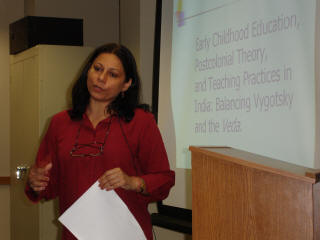
Conceptualized within a socio-cultural constructivist and postcolonial paradigm, the book explores a definite tension between “Western” theories of child development and the “Indian” ways of being and thinking. Based on the author’s doctoral study, the book provides a richly descriptive and relatively unexamined account of the culturally complex and multi-dimensional relationship that exists in urban India between formal teacher education, early childhood classrooms and the daily lived experiences of children and early childhood teachers.
Strong influences on how early education is understood and practiced in urban India have been carefully traced back to an ancient philosophy and psychology; to a colonial experience; and to more recent progressive educational ideas, all of which also define the daily lives of the people in urban India. Rich examples and anecdotes from the research data, concrete details, and several chapters devoted to the voices of teachers describing their classroom practice in terms of such issues as class size, educational aims, prescribed and hidden curricula, incorporating the teaching of values with the teaching of academics, and so forth, make this book one of the first of its kind.

